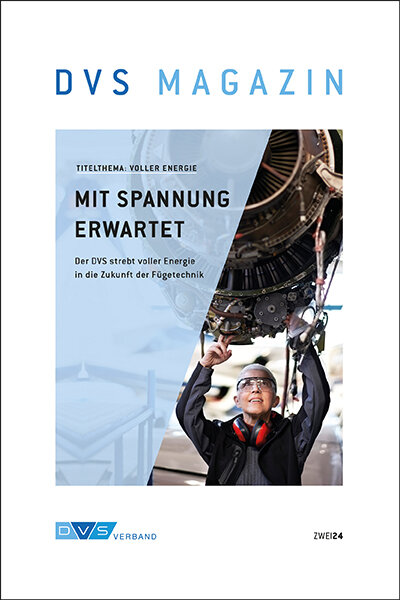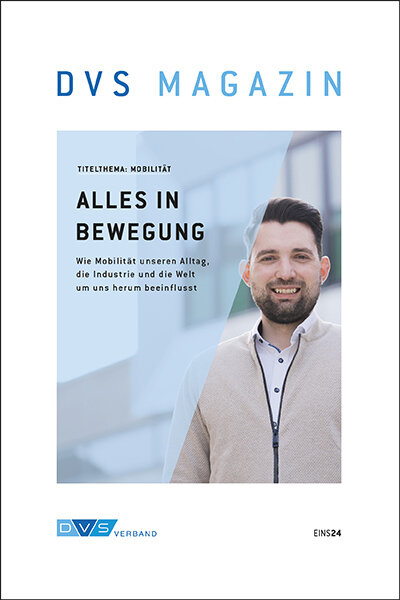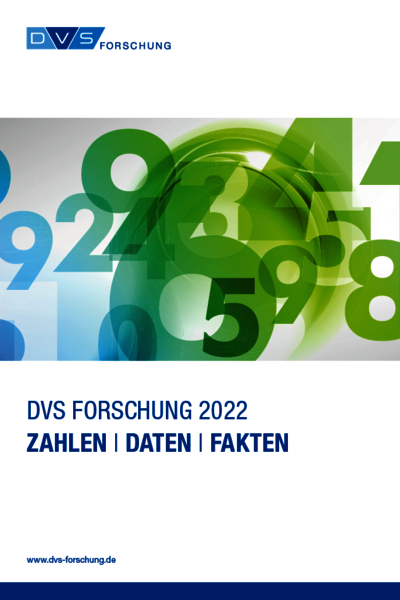Aus der Branche für die Branche?
Ja, auch! Aber die Informationen aus dem DVS sind nicht nur für Experten bestimmt. Sie stehen allen zur Verfügung, die sich für das Fügen, Trennen und Beschichten von Werkstoffen und Werkstoffverbunden interessieren. Deshalb nutzen Sie die kostenlose Downloadfunktion der DVS-Medien oder bestellen Sie das jeweilige Produkt über unser Bestellformular.
Ihr Kontakt im DVS
Mitgliederservice:
Manuela Kelzenberg / Birgit Oefinger
Alle Printmedien im Überblick

Titelthema Miteinander Verbunden
Wie die Begeisterung für Klebtechnik für starke Verbindungen im DVS sorgt und tragfähige Strukturen in der Fügetechnik schafft

Titelthema Perspektive
Vorwärts denken! Wie der DVS perspektivisch nach vorne schaut und wir alle der Weltleitmesse SCHWEISSEN & SCHNEIDEN 2025 entgegen fiebern

TITELTHEMA VOLLER ENERGIE
Wir bewegen uns voller Energie in die Zukunft. In diesem Magazin beleuchten wir die aktuellen Herausforderungen der Energiewirtschaft. Der Verband gestaltet die zukunftsorientierten Prozesse aktiv mit. Wir haben Neuigkeiten für Sie!

DVS FORSCHUNG 2023 ZAHLEN | DATEN | FAKTEN
Einen detaillierten Überblick über das Geschäftsjahr 2023 bietet die Forschungsvereinigung Schweißen und verwandte Verfahren e. V. im DVS, kurz: DVS Forschung, in ihrer neuen Broschüre ZAHLEN | DATEN | FAKTEN

Titelthema Mobilität
Der Frühling lockt uns nach draußen. Mobilität treibt uns an. Sie bedeutet individuelle Freiheit sowie technische Innovation. Gerade jetzt, wo Mobilität neu gedacht wird und innovative Antriebstechniken die Zukunft bestimmen. Als Verband setzen wir auf neue Mobilitätsdienstleister exklusiv für unsere DVS-Mitglieder. Wir haben Neuigkeiten für Sie!

DVS Forschung 2022: ZAHLEN | DATEN | FAKTEN
Einen detaillierten Überblick über das Geschäftsjahr 2022 bietet die Forschungsvereinigung Schweißen und verwandte Verfahren e. V. im DVS, kurz: DVS Forschung, in ihrer neuen Broschüre ZAHLEN | DATEN | FAKTEN.

Titelthema Antrieb: Los geht´s!
2023 war zweifellos ein turbulentes und ereignisreiches Jahr. Gerade in diesem Jahr ist der technologische Fortschritt unaufhörlich vorangeschritten. Inwiefern ist die Fügetechnik involviert? Was bedeutet das für uns? Wir fragen nach Antrieben in unserem Alltag und nach Ihrem ganz persönlichen Antrieb.

In Focus: Welding Qualification in the DVS
The qualification of companies, procedures and personnel ensures the competitiveness of companies. The knowledge of specialist and managerial staff is indispensable through processes, materials and tools for creativity and innovation – this applies to research and development as well as to production. Qualifications also support further development and maintenance of a persons ability to adapt to the ever-changing workplace.

In Focus: Laser Beam Welding and Allied Processes in the DVS
In recent years, the technology involved in the development of laser beam sources has taken huge steps forward. The result is that beam sources with practically any level of performance and beam quality have become available for industrial use. As such, for the non-specialist, the diverse range of beam sources with different wave lengths, levels of performance and price categories is difficult to overlook. These sources have an enormous usage potential in the most diverse sectors of industry.

In Focus: Electron Beam Welding in DVS
The electron beam can be used in the most diverse ways as a tool in research and development, as well as in large scale technical applications. In welding technology, it is predominantly used in vacuum chambers and is capable of welding nearly all metallically conductive joining members. Aviation and aerospace, energy plant engineering and heavy mechanical engineering are just a few sectors in which the advantages of the electron beam are recognised anew time and again and where this is then a yardstick for further developments and innovations as a “technology carrier”.
